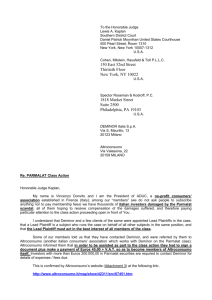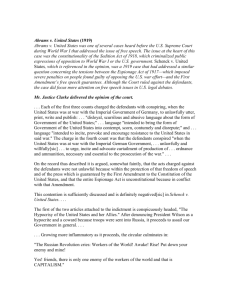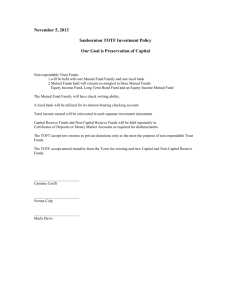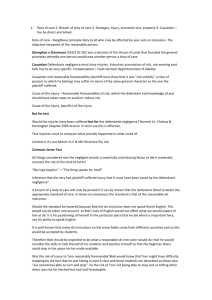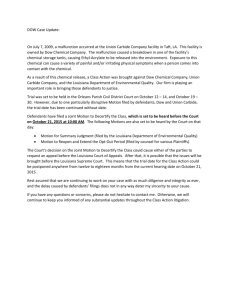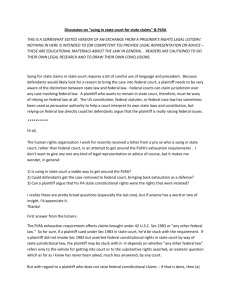Jury Trial Demanded 11/12/2004
advertisement
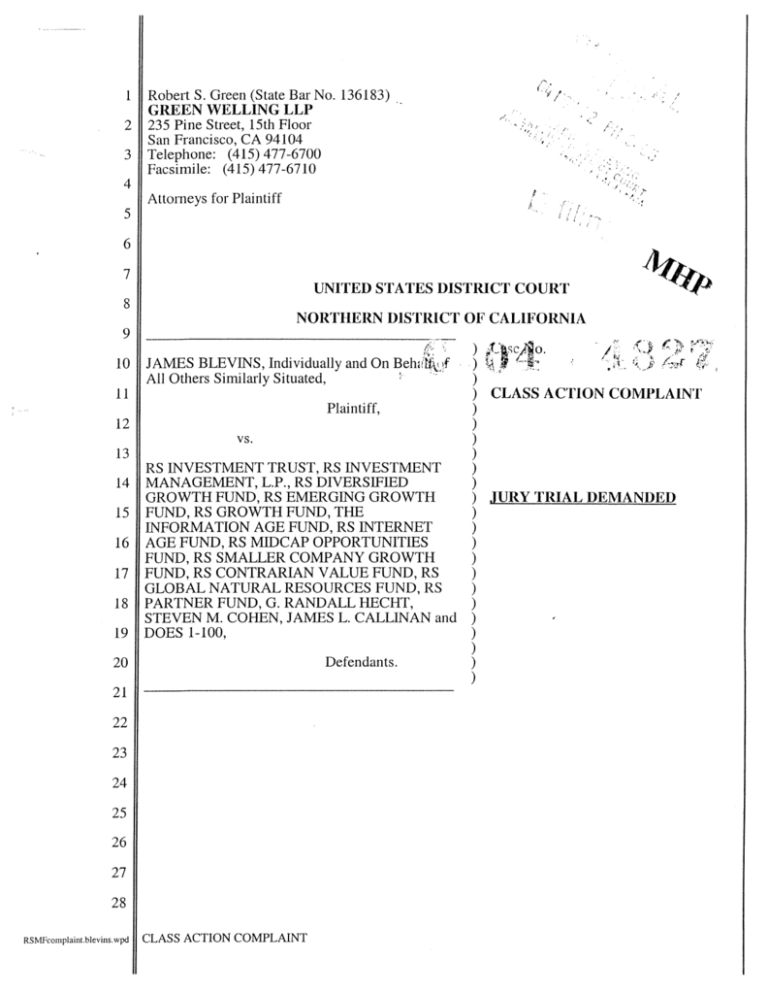
Robert S. Green (State Bar No. 136183) GREEN WELLING LLP 235 Pine Street, 15th Floor San Francisco, CA 94104 Telephone: (415) 477-6700 Facsimile: (415) 477-6710 1 2 3 t 7 4 Attorneys for Plaintiff I 5 6 7 UNITED STATES DISTRICT COURT 8 44V NORTHERN DISTRICT OF CALIFORNIA 9 scAo. J ) JAMES BLEV1NS, Individually and On Behtthyf ) ) All Others Similarly Situated, ) ) CLASS ACTION COMPLAINT Plaintiff, ) 10 11 12 vs. 13 RS INVESTMENT TRUST, RS INVESTMENT MANAGEMENT, L.P., RS DIVERSIFIED GROWTH FUND, RS EMERGING GROWTH FUND, RS GROWTH FUND, THE INFORMATION AGE FUND, RS INTERNET AGE FUND, RS MJDCAP OPPORTUNITIES FUND, RS SMALLER COMPANY GROWTH FUND, RS CONTRARIAN VALUE FUND, RS GLOBAL NATURAL RESOURCES FUND, RS PARTNER FUND, G. RANDALL HECHT, STEVEN M. COHEN, JAMES L. CALLINAN and DOES 1-100, 14 15 16 17 18 19 Defendants. 20 21 22 23 24 25 26 27 28 RSMFcomplaintblevinswpd 11 CLASS ACTION COMPLAINT JURY TRIAL DEMANDED Plaintiff, James Blevins ("Plaintiff"), by his attorneys, as and for his complaint, alleges II the following upon personal knowledge as to himself and his acts and as to all other matters upon 3 information and belief the following: NATURE OF THE ACTION 4 1. 5 6 This is a class action on behalf of a class (the "Class") of all purchasers, redeemers and holders of the mutual fund shares that are the subject of this lawsuit, who purchased, held, or 7 otherwise acquired shares between October 6, 1999 and October 5, 2004 (the "Class Period"), 8 seeking to pursue remedies under the Investment Company Act of 1940 (the "Investment 9 Company Act") and for common law breach of fiduciary duties. JURISDICTION AND VENUE 10 2. 11 The claims asserted herein arise under and pursuant to §36 of the Investment 12 Company Act [15 U.S.C. § 80a-35]. 13 3. This Court has jurisdiction over the subject matter of this action pursuant to 28 14 U.S.C. § 1331 and §36 of the Investment Company Act [15 U.S.C. § 80a-35]. 4. 15 Venue is proper in this District pursuant to 28 U.S.C. § 1391(b), as many of the 16 acts and practices complained of herein occurred in substantial part in this District 17 5. In connection with the acts alleged in this complaint, defendants, directly or 18 indirectly, used the means and instrumentalities of interstate commerce, including, but not 19 limited to, the mails, interstate telephone communications and the facilities of the national 20 securities markets. PARTIES 21 22 6. Plaintiff James Blevins bought shares of RS Emerging Growth Fund during the 23 Class Period and has suffered damages as a result of the wrongful acts of defendants as alleged 24 herein. 25 7. Defendant RS Investment Trust ("RS Trust"), or (the "Fund Registrant") is a 26 statutory trust. RS Investment Trust is the registrant and issuer of the shares of the following RS 27 Diversified Growth Funds, RS Emerging Growth Fund, RS Growth Fund, The Information Age 28 Fund, RS Internet Age Fund, RS Midcap Opportunities Fund, RS Smaller Company Growth SMFcompIaint.b1evinswpd CLASS ACTION COMPLAINT 1 1 Fund, RS Contrarian Value Fund, RS Global Natural Resources Fund, RS Partner Fund. RS 2 Investment Trust maintains its principle place of business at 388 Market Street, Suite 1700, San 3 Francisco, CA 94111. 4 8. Defendant RS Investment Management, L.P. ("RS Investments"), (or defendant "Advisor") located at 388 Market Street, Suite 1700, San Francisco CA, 94111, served as an 5 6 investment advisor to the RS Funds. 7 9. Defendant G. Randall Hecht ("Hecht") served as the President, Chief Executive 1 Officer and Chairman of the Board of Trustees for the RS Trust. 8 10. 9 Defendant Steven M. Cohen ("Cohen") served as the Treasurer and Chief 10 I Financial Officer of the RS Trust. 11. 11 Defendant James L. Callinan ("Callinan") was, at all relevant times, the manager 12 of RS Emerging Growth Fund. 12. 13 RS Diversified Growth Funds, RS Emerging Growth Fund, RS Growth Fund, The 14 Information Age Fund, RS Internet Age Fund, RS Midcap Opportunities Fund, RS Smaller 15 Company Growth Fund, RS Contrarian Value Fund, RS Global Natural Resources Fund, RS 16 Partner Fund, (collectively referred to as the "RS Funds") are mutual funds that are registered 17 under the Investment Company Act and managed by the Advisor Defendant. 18 13. Defendant RS Emerging Growth Fund is the RS mutual fund directly involved in 19 the wrongdoing alleged herein. 14. 20 The true names and capacities (whether individual, corporate, associate, or 21 otherwise) of defendants Does 1 through 100, inclusive, and each of them, are unknown to 22 Plaintiff, who sues said defendants by such fictitious names. Plaintiff is informed and believes 23 and thereon alleges that each of the defendants fictitiously named herein is legally responsible in 24 some actionable manner for the events described herein, and thereby proximately caused the 25 damage to the Plaintiff and the members of the Class. 26 CLASS ACTION ALLEGATIONS 27 I 15. Plaintiff brings this action as a federal class action pursuant to Federal Rules of 182 Civil Procedure 23(a) and (b)(3) on behalf of a class (the "Class"), consisting of all purchasers, LSMFcomplaint.blevinswpd 11 CLASS ACTION COMPLAINT 2 1 redeemers and holders of the mutual fund shares that are the subject of this lawsuit, who 2 purchased, held, or otherwise acquired shares between October 6, 1999 and October 5, 2004, 3 inclusive, (the "Class Period") and who were damaged thereby. Excluded from the Class are 4 defendants, the officers and directors of the Company, members of their immediate families and 5 their legal representatives, heirs, successors or assigns and any entity in which defendants have or 6 had a controlling interest. 7 16. The members of the Class are so numerous that joinder of all members is El impracticable. While the exact number of Class members is unknown to Plaintiff at this time and can only be ascertained through appropriate discovery, Plaintiff believes that there are hundreds or thousands of members in the proposed Class. 11 12 13 14 17. Plaintiffs claims are typical of the claims of the members of the Class, because I plaintiffs and all of the Class members sustained damages arising out of defendants' wrongful I conduct complained of herein. 18. Plaintiff will fairly and adequately protect the interests of the Class members and 15 has retained counsel who are experienced and competent in class actions and securities litigation. 16 19. A Class Action is superior to all other available methods for the fair and efficient 17 adjudication of this controversy, since joinder of all members is impracticable. Furthermore, as 18 the damages suffered by individual members of the Class may be relatively small, the expense 19 and burden of individual litigation make it impossible for the members of the Class to 20 individually redress the wrongs done to them. There will be no difficulty in the management of 21 this action as a class action. 22 20. Questions of law and fact common to the members of the Class predominate over 23 any questions that may affect only individual members, in that defendants have acted on grounds 24 generally applicable to the entire Class. Among the questions of law and fact common to the 25 Class are: (a) Whether the federal securities laws were violated by Defendants' acts as 26 27 alleged herein; 28 RSMFcomplaint.blevinswpd 1 CLASS ACTION COMPLAINT 3 (b) Whether Defendants breached their fiduciary duties by engaging in 1 2 fraudulent activity; and (c) Whether the members of the Class have sustained damages and, if so, what 3 4 is the appropriate measure of damages. SUBSTANTIVE ALLEGATIONS 5 I -mall 6 7 21. This action concerns a fraudulent scheme and course of action which was 8 intended to and indeed did benefit mutual funds and their advisors at the expense of mutual fund 9 investors. In connection therewith, defendants violated their fiduciary duties to their customers 10 I in return for substantial fees and other income for themselves and their affiliates. 11 22. The defendants' wrongful conduct involved "timing" of mutual funds. "Timing" is 12 an investment technique involving short-term, "in and out" trading of mutual fund shares. The 13 technique is designed to exploit inefficiencies in the way mutual fund companies price their 14 shares. It is widely acknowledged that timing inures to the detriment of long-term shareholders. 15 I Because of this detrimental effect, mutual fund prospectuses typically state that timing is 16 monitored and the funds work to prevent it. Nonetheless, in return for investments that will 17 increase fund managers' fees, fund managers enter into undisclosed agreements to allow timing. 18 23. In fact, certain mutual fund companies have employees (generally referred to as 19 the "timing police") who are supposed to detect "timers" and put a stop to their short-term trading 20 activity. Nonetheless, defendants arranged to give market timers a "pass" with the timing police, 21 who would look the other way rather than attempt to shut down their short-term trading. 22 24. The mutual fund prospectuses for the funds at issue created the misleading 23 impression that mutual funds were vigilantly protecting investors against the negative effects of 24 timing. In fact, the opposite was true: defendants sold the right to time their funds to hedge fund 25 investors. The prospectuses were silent about these arrangements. 26 25. As a result of "timing" of mutual funds, timers and late traders, and defendants 27 and their intermediaries profited handsomely. The losers were unsuspecting long-term mutual 28 fund investors. Defendants' profits came dollar-for-dollar out of their pockets. 6MFcomp1aint.b1evinswpd CLASS ACTION COMPLAINT !4i TIMING 1 2 26. Mutual funds are designed for buy-and-hold investors, and are therefore the 3 1 favored homes for Americans' retirement and college savings accounts. Nevertheless, 4 I quick-turnaround traders routinely try to trade in and out of certain mutual funds in order to I exploit inefficiencies in the way they set their NAVs. 5 6 27. This strategy works only because some funds use "stale" prices to calculate the 7 value of securities held in the fund's portfolio. These prices are "stale" because they do not 8 necessarily reflect the "fair value" of such securities as of the time the NAV is calculated. A 9 typical example is a U.S. mutual fund that holds Japanese shares. Because of the time zone 10 difference, the Japanese market may close at 2:00 a.m. New York time. if the U.S. mutual fund 11 manager uses the closing prices of the Japanese shares in his or her fund to arrive at an NAV at 12 4:00 p.m. in New York, he or she is relying on market information that is fourteen hours old. if 13 there have been positive market moves during the New York trading day that will cause the 14 Japanese market to rise when it later opens, the stale Japanese prices will not reflect them, and 15 the fund's NAY will be artificially low. Put another way, the NAY does not reflect the true 16 current market value of the stocks the fund holds. On such a day, a trader who buys the Japanese 17 fund at the "stale" price is virtually assured of a profit that can be realized the next day by selling. 18 Taking advantage of this kind of short-term arbitrage repeatedly in a single mutual fund is called 19 "timing" the fund. 20 28. Effective timing captures an arbitrage profit. And, the arbitrage profit from timing 21 comes dollar-for-dollar out of the pockets of the long-term investors: the timer steps in at the last 22 moment and takes part of the buy-and-hold investors' upside when the market goes up, so the 23 next day's NAY is reduced for those who are still in the fund. If the timer sells short on bad days 24 the arbitrage has the effect of making the next day's NAY lower than it would otherwise have 25 26 been, thus magnifying the losses that investors are experiencing in a declining market. 29. Besides the wealth transfer of arbitrage (called "dilution"), timers also harm their 27 target funds in a number of other ways. They impose their transaction costs on the long-term investors. Indeed, trades necessitated by timer redemptions can also lead to realization of taxable 6MFcomp1aint.b1evins.wpd 11 CLASS ACTION COMPLAINT 5 1 capital gains at an undesirable time, or may result in managers having to sell stock into a falling 2 market. Accordingly, fund managers often seek to minimize the disruptive impact of timers by 3 keeping cash on hand to pay out the timers' profits without having to sell stock. This "strategy' 4 does not eliminate the transfer of wealth out of the mutual fund caused by timing; it only reduces 5 the administrative cost of those transfers. However, at the same time it can also reduce the 6 overall performance of the fund by requiring the fund manager to keep a certain amount of the 7 funds' assets in cash at all times, thus depriving the investors of the advantages of being fully 8 invested in a rising market. Some fund managers even enter into special investments as an 9 attempt to "hedge" against timing activity (instead of just refusing to allow it), thus deviating 10 altogether from the ostensible investment strategy of their funds, and incurring further transaction 11 costs. 12 13 14 30. Mutual fund managers are aware of the damaging effect that timers have on their I funds. While it is virtually impossible for fund managers to identify every timing trade, large I movements in and out of funds are easy for managers to spot. And mutual fund managers have 15 tools to fight back against timers. 16 31. Fund managers typically have the power simply to reject timers' purchases. As 17 fiduciaries for their investors, mutual fund managers are obliged to do their best to use these 18 weapons to protect their customers from the dilution that timing causes. 19 32. The incentive to the defendant mutual funds to engage in such wrongdoing is as 20 follows. Typically a single management company sets up a number of mutual funds to form a 21 family. While each mutual fund is in fact its own company, as a practical matter the 22 management company runs it. The portfolio managers who make the investment decisions for 23 the funds and the executives to whom they report are all typically employees of the management 24 company, not the mutual funds themselves. Still, the management company owes fiduciary 25 duties to each fund and each investor. 26 33. The management company makes its profit from fees it charges the funds for 27 financial advice and other services. These fees are typically a percentage of the assets in the 28 fund, so the more assets in the family of funds, the more money the manager makes. The timer RSMFcomplaintblevins.wpd 11 CLASS ACTION COMPLAINT 6 1 understands this perfectly, and frequently offers the manager more assets in exchange for the 2 right to time. Fund managers have succumbed to temptation and allowed investors in the target 3 jJ funds to be hurt in exchange for additional money in their own pockets in the form of higher 4 5 I management fees. 34. Thus, by keeping money -- often many million dollars -- in the same family of 6 mutual funds (while moving the money from fund to fund), market timer assured the manager 7 H that he or she would collect management and other fees on the amount whether it was in the 8 target fund, the resting fund, or moving in between. In addition, sometimes the manager would 9 waive any applicable early redemption fees. By doing so, the manager would directly deprive the 10 fund of money that would have partially reimbursed the fund for the impact of timing. 11 As an additional inducement for allowing the timing, fund managers often 35. 12 received "sticky assets." These were typically long-term investments made not in the mutual 13 fund in which the timing activity was permitted, but in one of the fund manager's financial 14 vehicles (e.g., a bond fund or a hedge fund run by the manager) that assured a steady flow of fees 15 to the manager. 16 36. These arrangements were never disclosed to mutual fund investors. On the 17 contrary, many of the relevant mutual fund prospectuses contained materially misleading 18 statements assuring investors that the fund managers discouraged and worked to prevent mutual 19 fund timing. THE SCHEME WITHIN THE RS FUNDS 20 21 37. On September 3, 2003, the New York State Attorney General Elliot Spitzer (the 22 "Attorney General") attacked the mutual fund industry by filing a complaint charging fraud 23 against Stern and Canary in connection with the unlawful mutual practices of late trading and 24 timing. More specifically, the Attorney General alleged the following: "Canary developed a 25 complex strategy that allowed it to in effect sell mutual funds short and profit on declining 26 NAVs." Additionally, the Attorney General alleged that Canary set up arrangements with Bank of America, Bank One, Janus, and Strong to late trade and time those companies respective RKS SMFcomplaint.Nevinswpd mutual funds. The Attorney General further alleged: 11 CLASS ACTION COMPLAINT 7 Bank of America. . . (i) set Canary up with a state-of-the art electronic late trading platform, 2 allowing it to trade late in the hundreds of mutual funds that the bank offers to its customers, (ii) 3 gave Canary permission to time the Nations Funds Family (iii) provided Canary with 4 approximately $300 million of credit to finance this late trading and timing, and (iv) sold Canary 5 the derivative short positions it needed to time the funds as the market dropped. None of these 6 facts were disclosed in the Nations Funds prospectuses. In the process, Canary became one of 7 Bank of America's largest customers. The relationship was mutually beneficial in that Canary 8 made tens of millions through late trading and timing, while the various parts of the Bank of 9 America that serviced Canary made millions themselves. 10 38. In connection with an examination of active trading of mutual fund shares by the 11 United States Securities and Exchange Commission ("SEC") and the Attorney General, 12 defendants received inquiries and subpoenas for documents from those agencies. 13 14 39. On October 6, 2004, the Attorney General issued the following press release: ROBERTSON STEVENS SETTLES MARKET TIMING CASE Settlement Includes Enhanced Compliance Controls 15 16 17 18 19 20 21 22 23 State Attorney General Eliot Spitzer today announced a $30 million settlement with RS Investments (RS) to resolve allegations that the company permitted excessive market timing of its mutual funds. Under the terms of the settlement, which was reached in cooperation with the Securities and Exchange Commission, RS has agreed to pay $11.5 million in restitution and disgorgement to injured investors, $13.5 million in civil penalties and $5 million in a reduction of fees charged to investors over a five-year period. "RS managers and executives knew that arrangements with market timers were contrary to claims made in the company's prospectus and harmful to long-term investors," Spitzer said. "Despite this knowledge, company officials allowed and facilitated market timing of funds because it proved to be a lucrative source of fee revenues." 24 25 26 27 W . RSMFcomplaint.blevins.wpd Market timing activity within the RS Emerging Growth Fund first came to the Attorney General's attention during the investigation of Canary Capital Partners in the summer of 2003. Since then, coordinated investigations by state and federal regulators revealed that RS entered into agreements with other market timers, including Canary, which allowed them to engage in improper, frequent short-term trading of shares of the RS fund at the expense of other fund shareholders. 1 CLASS ACTION COMPLAINT 8 The agreements that RS made with timers were not disclosed to long-term investors. Indeed, the prospectus for RS' s equity funds told investors that: "You may not exchange your investment more than four times in any 12-month period. . . 2 3 As part of the settlement, RS has agreed to implement significant corrective measures designed to create greater board and adviser accountability and to prevent the kinds of abuses that gave rise to this investigation. 4 5 These measures include designation of an independent board chairperson with no prior connection to the company or its affiliates; enhanced compliance and ethics controls; new disclosure to investors of expenses and fees, and a commitment to hire a full-time senior officer to ensure that fees charged by the funds are negotiated at arm's length and are reasonable. 6 7 8 9 RS, located in San Francisco, is a mutual fund adviser to ten mutual funds with a total of approximately $5 billion in assets under management as of the end of 2003. 10 11 The Attorney General's investigation was handled by Senior Enforcement Counsel Roger Waldman and Assistant Attorney General Verle Johnson, under the supervision of David Brown IV, Chief of the Attorney General's Investment Protection Bureau, with assistance provided by Economist Hampton Finer of the AG's Public Advocacy Division. 12 13 14 15 40. As such, defendants have breached their fiduciary duties to Plaintiff and the class In by lying to investors about their effort to curb market timers by entering into undisclosed 17 agreements intended to boost their fees and permitting the Doe Defendants and others to time the 18 mutual funds. As a result, defendants have violated the Securities Act, the Exchange Act, the 19 Investment Company Act, and common law fiduciary duties. 20 THE RS FUNDS' PROSPECTUSES WERE MATERIALLY FALSE AND MISLEADING 21 22 41. The Prospectuses falsely stated that the RS Funds actively safeguarded 23 shareholders from the recognized harmful effects of timing. For example, in language that 24 typically appeared in the Prospectuses, the Prospectus acknowledged that "short-term trading" is 25 harmful to shareholders and represented that the RS Funds deters the practice, stating as follows: 26 Each Fund reserves the right in its discretion to reject any purchase, in whole or in part (including, without limitation, purchases by persons whose trading activity in Fund shares RS Investments believes could be harmful to a Fund), and to suspend the offering of its shares for any period of time and to change or 27 W. RSMFcomplaint.blevins.wpd 1 CLASS ACTION COMPLAINT 9 waive the minimum investment amounts specified in this Prospectus. 1 2 3 Given that defendants allowed market timing of its funds to occur, its 42. 4 prospectuses were false and misleading because they failed to disclose the following: (a) that defendants had entered into unlawful agreements allowing the Doe Defendants to time the 5 6 trading of the RS Funds shares; (b) that, pursuant to those agreements, the Doe Defendants 7 regularly timed the RS Funds; (c) that, contrary to the representations in the Prospectuses, 8 defendants only enforced their policy against frequent traders selectively; (d) that the defendants regularly allowed the Doe Defendants to engage in trades that were disruptive to the efficient 9 10 management of the RS Funds and/or increased the RS Funds' costs; thereby reducing the RS 11 Funds actual performance; and (e) the Prospectuses failed to disclose that, pursuant to the 12 unlawful agreements, the Doe Defendants benefitted financially at the expense of RS Funds' I investors including Plaintiff and other members of the Class. 13 COUNT ONE VIOLATION OF SECTION 36(a) OF THE INVESTMENT COMPANY ACT OF 1940 AGAINST ALL DEFENDANTS 14 15 43. 16 Plaintiff repeats and realleges each and every allegation contained above as if fully 17 I set forth herein. 44. 18 This claim for relief is brought pursuant to Section 36(a) of the Investment 19 Company Act of 1940 against defendants. Under Section 36(a), an implied private right of 20 action exists. See McLachlan v. Simon, 31 F. Supp.2d 731 (N.D. Cal. 1998). 45. 21 Under Section 36(a) of the Investment Company Act, defendants shall be deemed 22 to owe a fiduciary duty to plaintiff and other class members with respect to the receipt of fees and 23 compensation that defendants receive for services of a material nature. 24 46. 25 Here, defendants have devised and implemented a scheme to obtain substantial fees and other income for themselves and their affiliates by timing of RS Mutual Funds 26 throughout the Class Period and in violation of their fiduciary duties to their customers, i.e., as SMFcomp1aintb1evins.wpd plaintiff and class members. 11 CLASS ACTION COMPLAINT 10 Defendants engaged in such scheme to only benefit itself and their affiliates by 47. 1 2 allowing timing of various RS Mutual Funds named herein in return for substantial fees and U other income. ru 48. Defendants have breached the fiduciary duties it owes to plaintiff and other class members by, among other things, devising this plan and scheme solely for its own benefit and by 5 6 failing to reveal to them material facts which would allow them to make informed decisions I about the true value and performance of the Fund. 7 49. 8 Plaintiffs and other class members have been injured as a result of defendants! breach of fiduciary duty and violation of Section 36(a) of the Investment Act of 1940. COUNT TWO VIOLATION OF SECTION 36(b) OF THE INVESTMENT COMPANY ACT OF 1940 AGAINST ALL DEFENDANTS 10 11 50. 12 Plaintiff repeats and realleges each and every allegation contained above as if fully 13 set forth herein. 51. 14 This claim for relief is brought pursuant to Section 36(b) of the Investment 15 Company Act of 1940 against defendants. 52. 16 Under Section 36(b) of the Investment Company Act, defendants shall be deemed 17 to owe a fiduciary duty to plaintiff and other class members with respect to the receipt of fees and 18 compensation that defendants receive for services of a material nature. 19 I 53. Here, defendants have devised and implemented a scheme to obtain substantial 20 fees and other income for themselves and their affiliates by allowing timing of RS Mutual Funds 21 throughout the Class Period and in violation of their fiduciary duties to their customers, i.e., 22 plaintiff and class members. 23 54. Defendants engaged in such scheme to only benefit itself and their affiliates by 24 allowing timing of various RS Mutual Funds in return for substantial fees and other income. 25 55. Defendants have breached the fiduciary duties it owes to plaintiff and other Class 26 members by, among other things, devising this plan and scheme solely for its own benefit and by 27 I failing to reveal to them material facts which would allow them to make informed decisions about the true value and performance of the Fund. SMFcompIainLb1evins.wpd 11 CLASS ACTION COMPLAINT 11 M Plaintiff and other class members have been injured as a result of defendants' 56. 2 breach of fiduciary duty and violation of Section 36(b) of the Investment Act of 1940. COUNT THREE AGAINST ALL DEFENDANTS FOR BREACH OF FIDUCIARY DUTIES 3 4 5 57. Plaintiff repeats and realleges each and every allegation contained above as if fully 6 set forth herein. 7 58. Plaintiff and the Class placed their trust and confidence in RS Investments to 8 manage the assets they invested in the RS Mutual Funds. 9 59. Plaintiff and the Class reasonably expected that RS Investments would honor its 10 obligations to the them by, among other things, observing the securities laws and honoring the 11 representations made in the RS Mutual Funds' prospectuses. 12 60. RS Investments aided and abetted by the other Defendants, who are 13 co-conspirators, breached its fiduciary duties to the Plaintiff and the Class by violating the 14 securities laws and breaching express and implied representations contained in the RS Mutual 15 16 17 18 Funds' prospectuses for the benefit of Bank One, BOJA, and each of the other defendants. 61. Each of the Defendants was an active participant in the breach of fiduciary duty who participated in the breach for the purpose of advancing their own interests. 62. Plaintiff and the Class have been specially injured by defendants' wrongdoing. 19 For example, those class members who redeemed their shares during the Class Period received 20 less than what they would have been entitled to had certain individuals not engaged in illegal 21 market timing. Additionally, certain members of the Class (i.e., those who purchased their 22 mutual fund shares legally), were treated differently than those purchasers that were market 23 timers and/or late traders. 24 63. RS Investments aided and abetted by the other Defendants, who are also 25 co-conspirators, acted in bad-faith, for personal gain and in furtherance of his or her own 26 financial advantage in connection with the wrongful conduct complained of in this complaint. 27 28 6MFcomp1aint.b1evins.wpd 64. As a direct and proximate result of the defendants' foregoing breaches of fiduciary duties, plaintiff and the members of the Class have suffered damages. CLASS ACTION COMPLAINT 12 65. 1 RS Investments and the other Defendants, as alders, abettors, and co-conspirators, 2 are each jointly and severally liable for an amount to be determined at trial. PRAYER FOR RELIEF 3 4 66. WHEREFORE, Plaintiff on behalf of himself and of the Class pray for relief and 5 judgment, as follows: (a) Declaring this action to be a class action pursuant to Rule 23(a) and (b)(3) of 6 7 the Federal Rules of Civil Procedure on behalf of the Class defined herein; 8 (b) Awarding plaintiffs and the members of the Class damages in an amount 9 which may be proven at trial, together with interest thereon; 10 (c) Awarding plaintiffs and the members of the Class pre-judgment and 11 post-judgment interest, as well as their reasonable attorneys' and experts' witness fees and other 12 costs; 13 (d) Awarding such other and further relief as this Court may deem just and 14 proper including any extraordinary equitable and/or injunctive relief as permitted by law or 15 equity to attach, impound or otherwise restrict the defendants' assets to assure plaintiffs have an 16 effective remedy; and 17 (e) Such other relief as this Court deems appropriate. 18 I/I 19 I/I 20 I/I 21 I/I 22 23 24 25 26 27 28 SMFcompIaint.b1evins.wpd 11 CLASS ACTION COMPLAINT 13 1 JURY TRIAL DEMANDED 1 2 Plaintiff hereby demands a trial by jury. 3 4 DATED: November j T2004 GREEN WELLING LLP 5 6 By: 1 Green 7 4,0,41--v 235 Pine Street, 15th Floor San Francisco, CA 94104 Telephone: (415) 477-6700 Facsimile: (415) 477-6710 8 9 10 Attorneys for Plaintiff 11 12 13 14 15 16 17 18 19 20 21 22 23 24 25 26 27 28 SMFcomp1aint.b1evins.wpd 11 CLASS ACTION COMPLAINT 14 1


